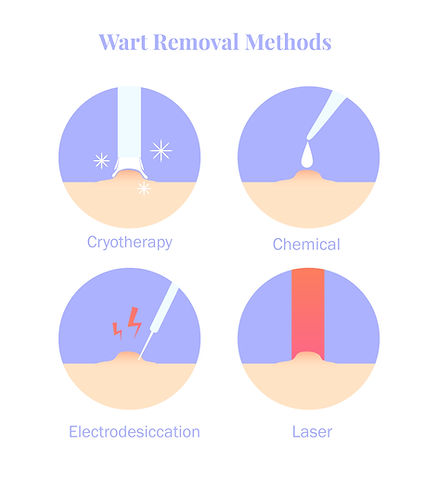Plantar warts, though often benign, can result in discomfort. These non-cancerous growths are caused by the human papillomavirus (HPV) and affect the soles of the feet. Their appearance and size may vary from case to case.
What are Plantar Warts?
Plantar warts are small growths that appear on the heels or balls of the feet. The pressure from walking and standing can cause these warts to be pushed beneath the skin’s surface, leading to their flat appearance.
Symptoms of Plantar Warts
Common symptoms include:
- Small, Fleshy Bumps: Usually flesh-colored or light brown, with a rough texture
- Pain or Discomfort: Discomfort when walking or standing
- Hardened Skin: The skin surrounding the wart might become hardened due to pressure
- Black Dots: Often, small black dots are visible within the wart. These dots are tiny blood vessels.
Causes of Plantar Warts
Plantar warts are caused by the human papillomavirus, which thrives in wet and warm places such as public gyms and swimming pools. The virus can enter the body through tiny cuts or breaks in the skin.
Children and those with weakened immune systems are at higher risk of developing plantar warts.
Treatment

Many plantar warts eventually disappear as the immune system fights off the virus. Persistent warts may be treated with:
- Over-the-Counter Medications: Salicylic acid-based treatments can help dissolve the wart gradually
- Cryotherapy: Freezing the wart using liquid nitrogen causes it to blister and eventually fall off
- Cauterization or curettage: This involves using an electrical current to burn the wart off or scrape it off with a sharp tool
- Laser Treatment: Laser therapy is used for more stubborn warts, targeting blood vessels that feed the wart
- Prescription Medications: Sometimes, a dermatologist might prescribe stronger medications to treat resistant warts.
Prevention
The best way to prevent plantar warts is to keep your feet clean and dry. This means not going barefoot in public places, such as locker rooms.
You should also wear fitting shoes, especially if you lead an active lifestyle. If you spot a wart on your foot, avoid scratching or picking it.
Conclusion
Plantar warts are common growths that appear on the soles of the feet. While often harmless, they could cause pain in some cases. Consult a podiatric physician if the warts persist, if you experience considerable pain, if the warts spread to other areas, or if you are diabetic or immunocompromised. ♦
Podiatrist newsletter article provided by LRW Media. Images provided by Mudrevskyi and Liliia Kyrylenko.
